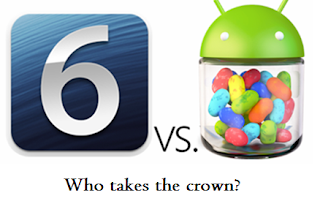The battle is hotter than a fever. The most-anticipated battle comes to a near close. Apple prides itself with their latest iOS 6 promising better apps, performance, and endurance far more than what users expect. However, the Android Jelly Bean is no sweet foe. Google’s latest operating system promises better edge, competence, and performance than all its predecessors. For a brief recap, the iOS 6 already has three points while Android Jelly Bean has two. Currently both have tied twice. Who will get a better grip on the throne? Who will get the coveted crown? Here is the third and final part of this thrilling event:
Cloud Integration
You probably have forgotten to synchronize your phone but Jelly Bean and iOS 6 are here to help you. Both operating systems can back up your data and synchronize it across the cloud for you. iCloud has the same basic functions and performance as any Cloud integration function. Android users also have the same options as the iCloud. Either way, both operating systems have cloud integration features that lets you access your data easily. No high and no lows.
However, there’s a catch. Operating systems allows cloud integration in their respective devices only. The only thing that differs is that this rule does not apply to everything. iCal lets you sync in Google Calendar while Gmail users prefer Sparrow to Mail.
Who gets this round? This is certainly a tie.
Bloatware Apps
Before going into specifics, what are bloatware apps? These are apps that consume a big chunk of your memory because these have many features in them. iTunes and Windows Vista are some of the examples found in computers.
In smartphones, bloatware apps are bloating because they have all the reason to be. They can be deadly and explode when forgotten. If you are intricate enough to maintain these apps, then you can expect these apps to bloat at a stable rate. Many bloatware apps in smartphones are games, so it is inessential to keep these apps. You should be wise in deciding which games to keep. The iOS 6 lets you choose whether to have bloatware in the first place. It’s good for iPhone and iPad users.
Android phones do not come with that option. So, having bloatware apps in these phones may be a burden. However, Android phones have the option of expanding memory through the microSD cards. If you have no choice but to keep these bloatware apps on your phones, then it’s best that you delegate the apps properly and place them accordingly. That way, you can still have a good performing RAM and more memory space.
Who wins this round? Well, it’s best to call this another tie. Both Android phones and Apple’s iPhones have options that you can choose.
Verdict
Between the two, who takes the crown? Well, seriously, it is hard to decide which operating system wins. Android has something iOS 6 cannot offer and vice versa. Users may be oscillating between both operating systems but what matters more is the users’ satisfaction. We might have to send the battle to the legal battlefield to decide who wins and loses.
If you wish to sell your iOS phone for an Android phone or your Android phone for an iOS phone, click here.
Subscribe to:
Post Comments (Atom)






amazing article , thanks for the helpful information you provid
ReplyDelete